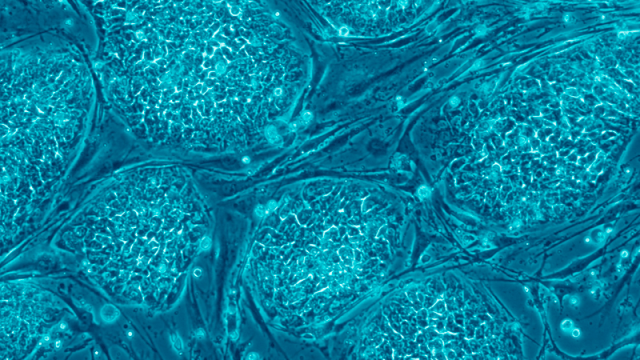Human embryonic stem cells. Image: Wikimedia
China has long been ahead of the US when it comes to human genetic engineering — there, the idea seems far less morally fraught. But for the first time, scientists in the United States have now genetically modified a human embryo, according to a new report in the MIT Technology Review. At Oregon Health and Science University, the publication reports, scientists are using the gene-editing technique CRISPR to alter the DNA of a “large number of one-cell embryos.”
In China, scientists have already edited the DNA of embryos several times over the past two years, in experiments that included making them HIV-resistant, and modifying the gene associated with a blood disorder. In Sweden, one researcher went as far as attempting to edit healthy human embryos. And in the U.K., scientists have been given the green-light to edit genes in embryos, too.
In the US, however, what’s known as “germline editing” is an ethical minefield, tied to debates about abortion, religion, societal inequality, and safety. This past spring, the National Academy of Sciences released a 261-page report that gave a cautious go-ahead to human gene-editing, endorsing the practice for purposes of curing disease but determining that uses such as creating so-called “designer babies” are unethical. After that, it was only a matter of time.
In the Oregon experiment, the embryos were not allowed to develop for more than a few days, according to the Tech Review. But the research could help determine how feasible it is to simply correct genes associated with inherited disease. In the publications stemming from Chinese research, imperfect results called the safety of germline editing in order to create a person into question. Gizmodo has reached out to the OHSU scientists for more information on the details of their experiments, and we will update this post if we hear back.
Safety is not the only barrier, though. Modifying human DNA in ways that could eventually be passed on to future generations has long been considered ethically complicated — in many countries, it is altogether banned. In the US, Congress has blocked any clinical trials with the aim of turning an edited IVF embryo into a baby. And while other experiments involving genetically-engineered embryos are allowed, Congress has also blocked federal funding for any clinical research “in which a human embryo is intentionally created or modified to include a heritable genetic modification.” Considering that the National Institutes of Health funds some $US30 ($38) billion in medical research every year, that’s a pretty big hurdle.
One day, as the National Academies of Science report put it, human germline editing to eradicate disease could be legal in the US with “stringent oversight.” But there are a lot of hoops to jump through, first.
